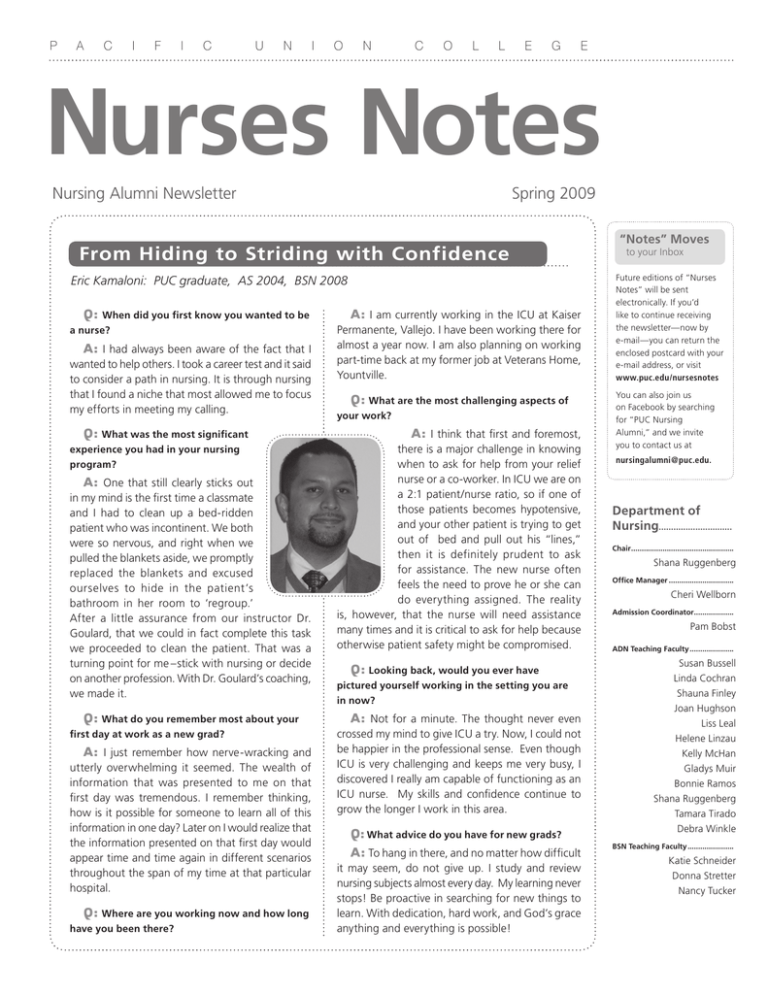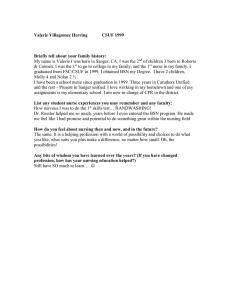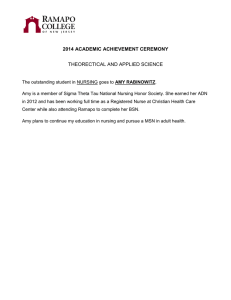Nurses Notes From Hiding to Striding with Confidence Nursing Alumni Newsletter Spring 2009
advertisement

p a c i f i c u n i o n c o l l e g e Nurses Notes Nursing Alumni Newsletter Spring 2009 From Hiding to Striding with Confidence Eric Kamaloni: PUC graduate, AS 2004, BSN 2008 Q: When did you first know you wanted to be a nurse? A: I had always been aware of the fact that I wanted to help others. I took a career test and it said to consider a path in nursing. It is through nursing that I found a niche that most allowed me to focus my efforts in meeting my calling. Q: What was the most significant experience you had in your nursing program? A: One that still clearly sticks out in my mind is the first time a classmate and I had to clean up a bed-ridden patient who was incontinent. We both were so nervous, and right when we pulled the blankets aside, we promptly replaced the blankets and excused ourselves to hide in the patient’s bathroom in her room to ‘regroup.’ After a little assurance from our instructor Dr. Goulard, that we could in fact complete this task we proceeded to clean the patient. That was a turning point for me –stick with nursing or decide on another profession. With Dr. Goulard’s coaching, we made it. Q: What do you remember most about your first day at work as a new grad? A: I just remember how nerve-wracking and utterly overwhelming it seemed. The wealth of information that was presented to me on that first day was tremendous. I remember thinking, how is it possible for someone to learn all of this information in one day? Later on I would realize that the information presented on that first day would appear time and time again in different scenarios throughout the span of my time at that particular hospital. Q: Where are you working now and how long have you been there? A: I am currently working in the ICU at Kaiser Permanente, Vallejo. I have been working there for almost a year now. I am also planning on working part-time back at my former job at Veterans Home, Yountville. Q: What are the most challenging aspects of your work? A: I think that first and foremost, there is a major challenge in knowing when to ask for help from your relief nurse or a co-worker. In ICU we are on a 2:1 patient/nurse ratio, so if one of those patients becomes hypotensive, and your other patient is trying to get out of bed and pull out his “lines,” then it is definitely prudent to ask for assistance. The new nurse often feels the need to prove he or she can do everything assigned. The reality is, however, that the nurse will need assistance many times and it is critical to ask for help because otherwise patient safety might be compromised. Q: Looking back, would you ever have pictured yourself working in the setting you are in now? A: Not for a minute. The thought never even crossed my mind to give ICU a try. Now, I could not be happier in the professional sense. Even though ICU is very challenging and keeps me very busy, I discovered I really am capable of functioning as an ICU nurse. My skills and confidence continue to grow the longer I work in this area. Q: What advice do you have for new grads? A: To hang in there, and no matter how difficult it may seem, do not give up. I study and review nursing subjects almost every day. My learning never stops! Be proactive in searching for new things to learn. With dedication, hard work, and God’s grace anything and everything is possible! “Notes” Moves to your Inbox Future editions of “Nurses Notes” will be sent electronically. If you’d like to continue receiving the newsletter—now by e-mail—you can return the enclosed postcard with your e-mail address, or visit www.puc.edu/nursesnotes You can also join us on Facebook by searching for “PUC Nursing Alumni,” and we invite you to contact us at nursingalumni@puc.edu. Department of Nursing.............................. Chair.................................................. Shana Ruggenberg Office Manager................................ Cheri Wellborn Admission Coordinator.................... Pam Bobst ADN Teaching Faculty...................... Susan Bussell Linda Cochran Shauna Finley Joan Hughson Liss Leal Helene Linzau Kelly McHan Gladys Muir Bonnie Ramos Shana Ruggenberg Tamara Tirado Debra Winkle BSN Teaching Faculty....................... Katie Schneider Donna Stretter Nancy Tucker Nurses Notes Faculty Update – New People, New Roles By Joan Hughson New roles were assumed by several faculty at the beginning of the 2008 term. Shana Ruggenberg became the chair of the nursing department and is one of many current faculty who were PUC students. She earned her AS and BSN degrees at PUC and in 1993 earned her master’s in nursing from UCLA as a clinical nurse specialist in maternal child health. In 2000 she joined the PUC nursing department, teaching in her specialty in the on-campus and off-campus programs. Shana completed her Ed.D. in 2008. Her leadership, teaching skills, and professionalism are highly admired by faculty and students alike. Shana Ruggenberg, nursing department chair Other role changes include Nancy Tucker and Joyce Wallace. Nancy now coordinates the RN to BSN program. She brings years of department leadership to her new role and is enjoying the opportunity to have closer contact with students through advising and teaching. We are pleased that Joyce, although now officially retired, continues to offer her extensive educational experience to our students, volunteering one day a week to help students develop their ability to critically apply their knowledge in test-taking situations. We are also pleased to welcome two new full-time faculty members this year: Helene Linzau and Tamara Tirado. Both are graduates of PUC and know the program well. We’re delighted they’ve joined the faculty. Helene has taken over the challenges of introducing our first-quarter students to the fundamentals of nursing practice. She brings a wealth of knowledge, garnered over years of practice in critical care settings. Helene’s career in healthcare started with a degree in Respiratory Therapy from Loma Linda University. A short time later, she entered PUC’s nursing program, graduating with her BSN in 2000. Helene discovered a love for teaching when working with students in the hospital setting and enjoys the challenges that come with helping students of different ages, backgrounds, and perspectives learn the basics of nursing practice. Helene’s students value her depth of understanding and the fact that she pushes them to think more deeply about why they do what they do. Tamara has accepted the responsibility of ensuring that third-quarter students have a solid understanding of all aspects of patient assessment and are ready to begin caring for multiple patients in increasingly critical environments. Tamara now focuses her expertise on the care of patients of every age in a clinic/community setting. She completed her basic nursing education at PUC, graduating with her BSN in 2001. She then completed a master’s degree in Nursing/Family Practice at Sonoma State University. She is currently a boardcertified Family Nurse Practitioner. Similar to Helene, Tamara became interested in teaching after working with students in the hospital. Tamara’s students are very appreciative of the time she takes with them in clinicals, helping to make even challenging situations seem more understandable and less nerve-wracking. RN to BSN Program By Nancy Tucker The RN to BSN program is on the cutting edge of a professional trend as more and more hospitals seek Magnet Status as part of their strategic plans and are encouraging their ADN nurses to complete the BSN degree. We are currently in partnership with Northbay Health Care, which has hospitals at Fairfield and Vacaville, to offer their ADN nurses our program on the VacaValley campus. We are also talking with Queen of the Valley Hospital in Napa to provide our program on their campus. Nurses Notes If you don’t already have a BSN, PUC can help you obtain this degree! You can be done in three quarters. You may continue your work because you only come to campus for two core weeks per quarter. You can even do your clinical in the locale where you live, and plan your clinical schedule around your work time. Another option is to take one class at a time and complete the program on your schedule. Is it important to complete a BSN degree? Yes — you gain knowledge, strengthen critical thinking skills, and broaden your thinking and values about nursing issues and patients. Recently, one of our graduates told me how glad she was that she had completed her BSN and how it has helped her to be a much better nurse. She would like all ADN graduates to know the rewarding advantages of furthering their education. Off-Campus LVN to RN Programs Update By Debbie Winkle The non-traditional LVN to RN programs at the Hanford and Travis Air Force Base campuses continue to be in demand. Twenty-four Travis students graduated in June and 25 new students oriented in November and began classes in February. Nineteen Hanford students graduated in November and a new class of 24 will begin in April. Students continue to juggle full-time work, family, life’s challenges, and nursing school. A home-cooked meal, reading a book (other than a 2008 Hanford graduates textbook), sleeping in late on the weekends, a leisurely walk, and even yard work have become distant memories. Adding to the demands of nursing school, 10 of the recent Travis graduates were deployed to Iraq, Afghanistan, Kuwait, and Germany during the program. They packed their texts, assignments, and laptops to stay caught up with their studies as best as possible during their four- to six-month deployments. Care plans written from war operations on young men and women who suffered multiple traumas contrast vastly with the hospital med-surgical care plans completed by their colleagues on a regular clinical day. We are grateful not only for what these students contribute to those caught in harm’s way, but for the personal sacrifices they make daily to serve others. 2008 Travis Air Force Base graduates


